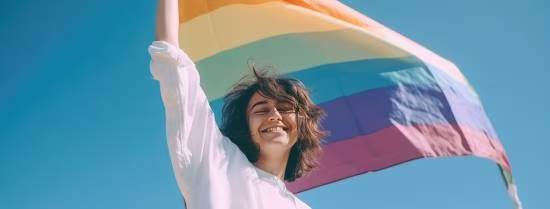In this short interview, we speak with Associate Professor Elissaios Papyrakis about a new research project on the challenges local LGBTQ+ youth and refugees face.
He tells us more about the urgency of the topic and the impact the research project aims to have.
Can you tell us what the research is about?
‘This research looks at the specific challenges that LGBTQ+ refugees and youth face in The Hague. These subgroups within the LGBTQ+ community are particularly vulnerable to stigmatization, loneliness, and mental distress. Our idea is to make policymakers better understand their situation so they can make better policies to support them. We also want to reduce stigmatization and prejudice of LGBTQ+ youth in their school environment. We will visit secondary schools with a documentary and spread awareness.
I am honoured to work with Naomi van Stapele. She is a lector on Inclusive Education at the Centre of Expertise Global & Inclusive Learning at The Hague University of Applied Sciences (THUAS). Furthermore, we will collaborate with Rainbow Den Haag, a nonprofit organization supporting local LGTBQ+ migrants and the Jong & Out programme of COC Haaglanden.’
LGBTQ+ youth and refugees will be recruited as research assistants for this project. How will this citizen science approach enhance the effectiveness of the project?
‘For me it was important that when we research their life experiences, we actually hear their voice and do research with them, rather than about them. Youth and refugees will open up more easily to researchers who share their identity and who can empathize with their struggles. I see this as a way to ensure that the policy recommendations for the municipality are drawn directly from the community.
'It [is] important that ... we actually hear their voice and do research with them, rather than about them.'
Furthermore, equipping these research assistants with research skills will strengthen their career perspectives within the city of The Hague and the wider region. Especially since these groups often face discrimination on the job market, I hope that this experience will empower them and help them in their professional career.’
What kind of impact does the project hope to achieve, and how will this be realized?
‘Our overall vision is to improve equal opportunities and social safety of LGBTQ+ young people and refugees in The Hague and the region of South Holland. On one hand, this includes advising municipality of The Hague and raising awareness at schools, so that social exclusion can be reduced. On the other hand, we also want to bring together all interested parties in a collaborative network that can improve the situations of these marginalized groups in the long run.
So all in all, I have high hopes for this project, and I am sure that together with my partners, we will be able to realize them.’
Thank you very much for this interview!
- Associate professor
- More information
- Related content

